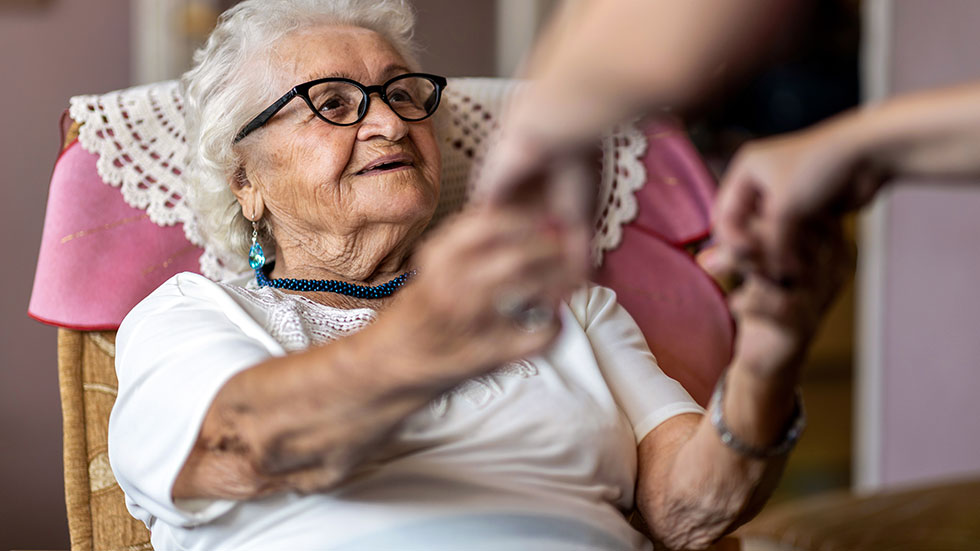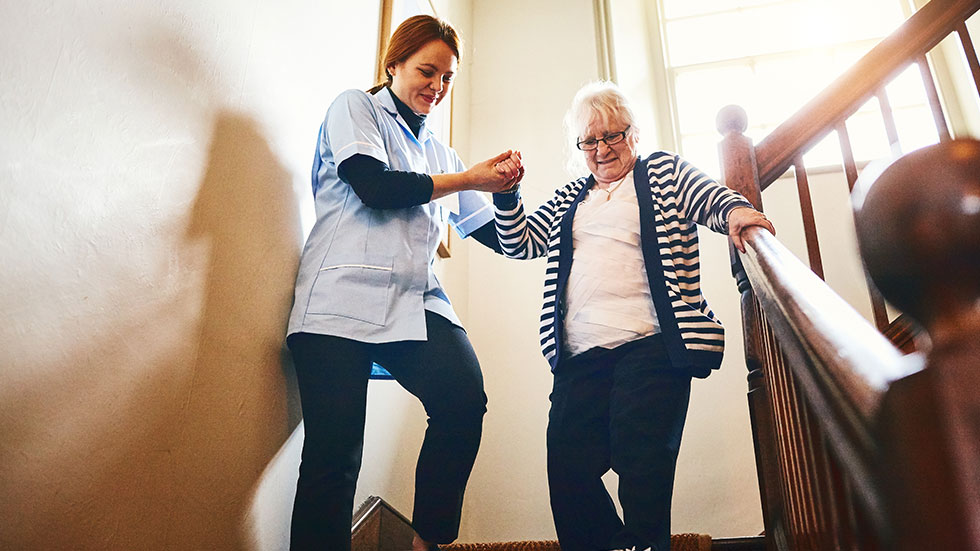

As your parents or loved ones age, it’s important to have regular conversations about their physical and mental health as well as the needs they may have. However, these conversions can be challenging.
Adjusting to change can be difficult for aging parents, especially when it affects their routines or forces them to face the fact that they’re getting older and may no longer be able to care for themselves. Here are seven tips to help you transition your aging parents or loved ones to in-home care.

What is in-home care?
In-home care, or home health care, is when a professional caregiver comes into a patient’s or client’s home to provide supportive care and to assist with activities the patient or client may no longer be able to do. In-home care often means your parents or loved ones can continue to safely live in their home. Home care services can include a variety of services such as:
- Personal care like bathing, washing hair, or getting dressed.
- Household chores, like cleaning, yard work, and laundry.
- Cooking.
- Running errands.
- Transportation to and from activities or doctor appointments.
- Light medical assistance, like helping with medications, dressing wounds, or changing bandages.
The type of in-home care your parents or loved ones need depends on their personal situation. For example, they may only need help with household chores because they can’t get around as easily as they used to. Or, they may need some medical assistance and help caring for themselves because they are unable to bathe or ensure proper medical care on their own.
Oftentimes, friends, family members, or neighbors provide a lot of assistance. But eventually, it may be helpful to hire a professional who can ensure your parents are getting the care they need.

How to transition your parents to in-home care
If your parents are experiencing in-home care for the first time, they may be nervous, anxious, or even frustrated. Change in routines and care can be overwhelming. Here are some tips to make the conversations and transition easier.
1. Be Aware of Warning Signs
Aging parents are likely to hide the fact that they need help, because it can be difficult to admit. That’s why it’s important to watch for warning signs that may signal your parents needs in-home care.
Some signs to watch for include:
- Difficulty completing daily tasks or chores, like cooking, shopping, cleaning, etc.
- Decline in or lack of personal care, like bathing.
- Evidence of cognitive impairment, such as forgetfulness, wandering, or confusion.
- Putting themselves in potential danger, like forgetting to turn off the stove.
- Inability to perform necessary medical tasks, like taking their medications properly or caring for wounds.
You know your parents or loved ones best, so you’ll know if they have major changes in their physical or mental behavior or activity that is cause for concern.
2. Start Small
When you first introduce home care, it can quickly become overwhelming and even frustrating. It’s easy for seniors to feel like a stranger is coming in and taking over their routines and their life. Starting small, such as having a caregiver come in for one or two hours per week, can help make the transition easier. This can also enable your parents to get used to having the caregiver around and getting help with their personal care or other activities. Then, you can adjust their care plan from there.
Chances are that your parents will come to rely on this in-home care as a way to ensure their health and their home are being taken care of.
3. Introduce the Caregiver
Before the caregiver starts, set up a meet-and-greet with your parents. Give them a chance to meet the caregiver, ask questions, and feel more comfortable. Arrange this meeting over an activity your parents enjoy, such as getting coffee, gardening, or playing a card game.
4. Highlight the Benefits
Even after your parents meet the caregiver, they still may feel hesitant or fearful to let someone come into their home. Have a conversation with your parents about those concerns. Ask what their fears may be or why they are concerned about the in-home help. Approach this gently and listen to their perspectives, but also reassure them and try to point out the benefits. In many cases, your parents may not even realize all the positives in-home care can bring.

5. Include Them in the Planning
Having someone come into your home to help you care for yourself or your space can make you feel like you’re losing control of your life. Including your parents in all of the planning can help prevent this. Start by working together to make a list of everything they could use help with, but allow them to keep a few things to do themselves, to encourage their independence.
If your parents have medical conditions that warrant in-home care, talk with their doctor about the benefits and his/her recommendations. Do research together to find a reliable, trustworthy, and expertly trained caregiver that your parents feel comfortable with. And, if you can, include them in conversations with the caregiver so they don’t feel like they are being spoken for or excluded.
6. Be Open to Questions or Concerns
This can be a big change, so be open to any of your parents’ questions or concerns about care. Give them the information and support they need to be more comfortable with the decision. Be frank about their needs and the reasons for in-home assistance, but do what you can to help them feel more prepared and confident.
7. Create and Maintain a Support System
Even if your parents are getting help at home with a caregiver, it’s still important to create a social support system to prevent loneliness and declining mental health. Work with friends, family members, and neighbors to ensure your parents get time with those who are most important to them. You can also help get them involved with a community center, senior center, or local group to keep them active and in touch with others.
